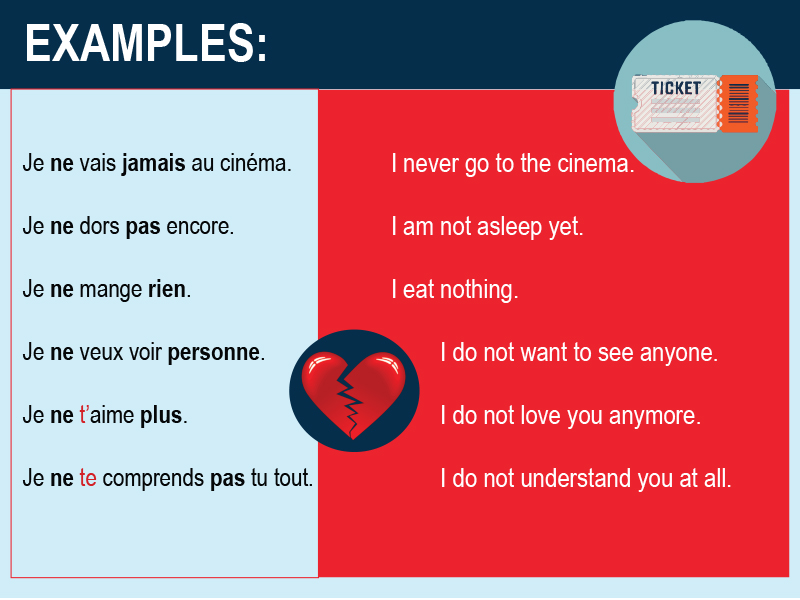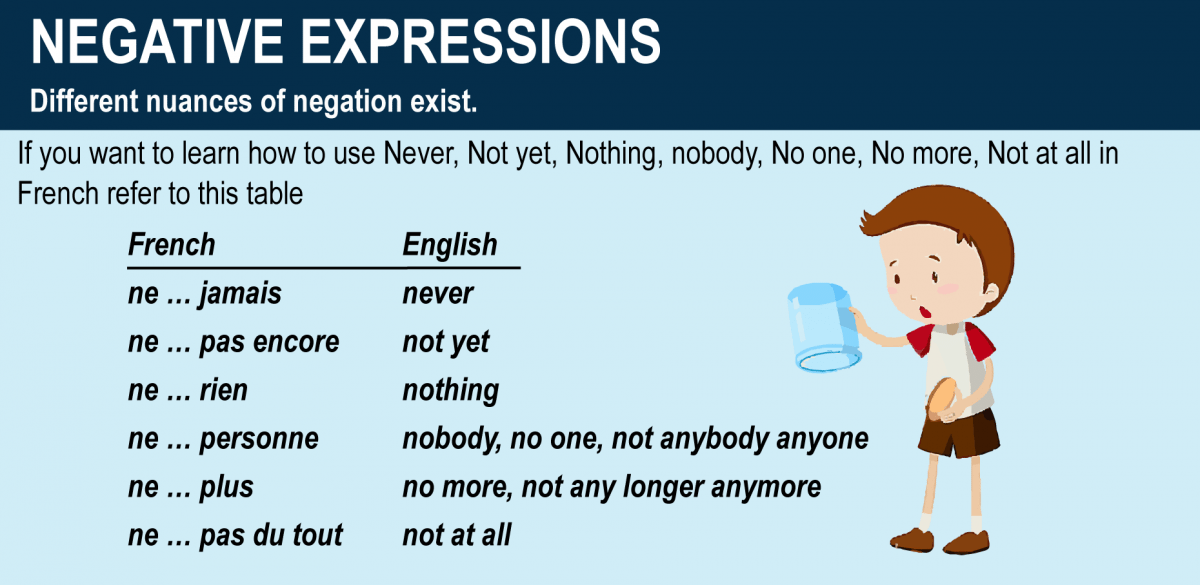Negative sentences in French need to use 2 negative terms. Most of the time you just need to add “ne” before the verb and “pas” after it.
Making Negative Sentences in French is a bit more complicated than in English, but with good explanations, it will be easier than expected!
Before proceeding, answer the below questions
- Have you ever been in trouble with negative sentences in French?
- Is it tricky for you to build a negative sentences in French that make sense?
- Do you need to improve your French?
- Do you want to speak French Fluently?
If the answer is Yes! Just read through this lesson on Negative Sentences.
You will get a better understanding of French grammar and be able to speak and write French more fluently!
French Negative Sentences Examples
Je ne danse pas. I do not dance !
But if you put the “ne” “pas” anywhere in the sentence, it won’t make much sense.
Our lesson here will help you to understand this.
French is such a wonderful language, you have many different ways to say No.
Never, not yet, nothing, nobody, no one, no more, not any longer or not at all !
In this course, we will explain how to use all these negative sentences.
How to easily write negative sentences in French?
In French, we can turn a positive phrase into a negative one with the use of two words “ne” “pas”.

But where do we have to put them?
No worries, we will help you with all of this.
If you want your sentence to make sense you have to be careful and you need to add “ne” before the conjugated verb and “pas” after it.
Learning French is easy when you have the right rules.
Look at these examples:
- Je fume. (I smoke)
- Je ne fume pas. (I do not smoke)
It is quite simple. Even if you change the tense.
Note that in front of a vowel “ne” becomes “n’” It’s easier to pronounce.
- Je n’ai pas fumé. (I do not smoke)
- Je n’aime pas le chocolat. (I do not like chocolate)
- Je n’attrape pas de poisson à la pêche. (I do not catch fish when fishing)
Before going any further, it’s essential for you to know that there are two cases where you have to be careful while using “ne” “pas”.
With the past compound (passé composé) and the near future (futur proche) you have to put “ne” in front of the first conjugated verb and “pas” just after that one.
Since the passé composé is constructed using avoir or être + past participle, you only put “ne” + “pas” around the conjugated verb, that is être or avoir.
The near future tense is constructed using aller + infinitive verb. In this case, make sure you put “ne” and “pas” around “aller” and not around the infinitive verb.
Negative Sentences in French Examples:
Je n’ai pas mangé de chocolat hier. (I did not eat chocolate yesterday)
Je ne vais pas aller à Londres demain. (I am not going to London tomorrow)

Be also careful while using object pronouns, for instance if you want to say I did not eat it yesterday, Je ne l’ai pas mangé hier! (while speaking of the chocolate)!
When there is an object pronoun, instead of ne + verb + pas, you say ne + pronoun + verb + pas.
Paul ne fera pas cet exercice. (Paul will not do this exercise)
Paul ne le fera pas. (Paul will not do it)
Je ne prends pas le train. (I do not take the train)
Je ne le prends pas. (I do not take it)
This is exactly the same while using pronominal verbs. The construction is ne + pronoun + verb + pas.
Vous vous levez tôt le matin. (You get up early in the morning.)
Vous ne vous levez pas tôt le matin. (You do not get up early in the morning.)
Different nuances of negation exist. If you want to learn how to use Never, Not yet, Nothing, nobody, No one, No more, Not at all in French refer to this table
Negative expressions in French

French negative expressions Examples:
Je ne dors pas encore.
Je ne mange rien.
Je ne veux voir personne.
Je ne t’aime plus.
Je ne te comprends pas tu tout.
I am not asleep yet.
I eat nothing.
I do not want to see anyone.
I do not love you anymore.
I do not understand you at all.
Now you have all you need to speak and write Negative Sentences in French properly. Just a quick note before ending this lesson.
You probably have noticed that most of the time French People drop the “ne” while speaking. They say , j’aime pas instead of je n’aime pas.
It’s quite common in an informal communication, but do not drop the “ne” in writing.
If you want to practice your French, or improve your verbal communication, just enroll in one of our wonderful classes at French Lessons Australia.






